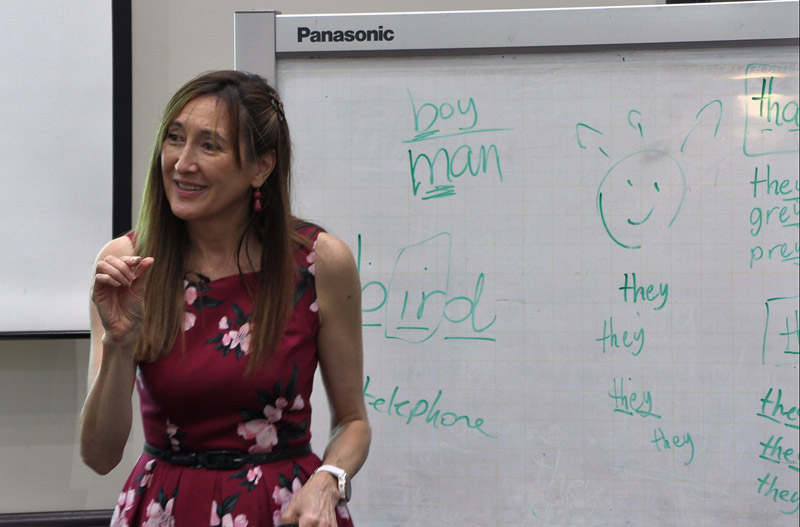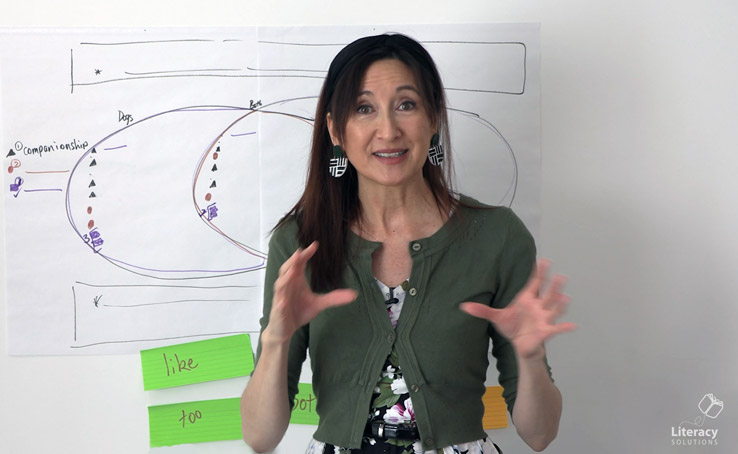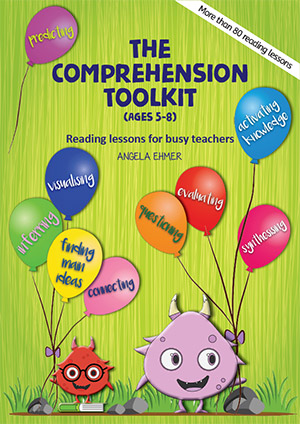Expect and Encourage Opt-in Learning Behaviour
Many students choose to listen rather than actively participate in learning conversations. Yet to achieve the best possible outcomes, teachers must expect that students OPT IN to literacy learning; opting out should not be an option. It must be our clear expectation to students that we expect full and active participation.
I’ve recently been talking up the importance of active engagement by students to build proficiency across all areas of literacy. Too often we observe students demonstrating passive learning behaviours rather than active learning behaviours.
It is often evident in guided reading …. As students finish reading the text, many don’t exhibit the behaviour of highly proficient readers … reflection … a desire to talk about or share something from the text … to challenge something they have read or previously understood … the assimilation of new understandings with old … and so on. In contrast to this, many students finish reading and look to the teacher to be told about what to think about.
Observations are also evident during whole class lessons. Some students consistently opt in; others are consistent in opting out.
Where students fail to demonstrate a willingness to participate, we must view this as data which informs teaching judgments:
- What do I observe this student CAN do?
- What is the barrier, or possible barrier to this student opting in?
- What supports must I, and will I provide to overcome this barrier?
- If I provide these supports, what should I expect to see?
- If I don’t see this, what further action can I take? Or, what are my options for doing it differently?
Using Statements
The use of statements can be valuable in promoting and encouraging student participation. Unlike questions which may suggest to students that you are seeking a “right answer”, a statement may be viewed as less threatening.
Some examples:
- I’m wondering about …
- I’m interested in what the author means by …
- Let’s talk about the feelings of …
- Let’s consider some other ways of looking at …
- I wonder why … (character) might have … (action)
- I’m questioning why … (might have happened there)
- I’m thinking that perhaps …
- I’m interested in your thoughts about …
- Let’s imagine it from … (character) point of view and be thinking …
- I’m interested in why/how your experiences might help you to see it like …
- I’m wondering why so many authors might …
- I’m wondering why a character might …
- That prompts me to wonder about …
- That prompts me to think that perhaps …
- I’m interested in how you view …
- I’m wondering about your take on that, … (student’s name)
- I’m keen for someone to shed some light on why/how/what …
- Let’s share our experiences about … to better understand …
- Pool your knowledge with a friend and be ready to talk about … (why/how/what from the text).
- Let’s share some reasons for …
- Chat with a friend and think about … (why/how/what from the text).
- Build on that idea please … (student’s name)
- Add to that thinking please … (student’s name)
- Keep … (student’s name) idea going please … (student’s name)
- I’m keen to hear from … (student’s name) about why …
- Talk about why we might see …
- Discuss the ways the reader might view …
- Let’s challenge the way we are thinking about … and imagine it from … (another perspective)
- Let’s consider … from another vantage point.
- Get us started please, … (student’s name) as we think about why …
- Let’s try to solve why …
- … (student’s name), tell us your thoughts on that.
- … (student’s name), share your ideas about …
- … (student’s name), help us to understand …
- … (student’s name), let’s try to imagine how …
- … (student’s name), I wonder how your experiences help you to understand …
Ultimately our role is to build independence and position students to succeed without us. To do this, students must be well positioned to self-direct, self-manage and self-monitor their learning.
So, what must students know and understand about learning?
- They (as individuals) are the primary stakeholders in the outcomes of their learning.
- Active participation will be supported and encouraged, but IS expected.
- You can’t get good at something from the sideline. You must get into the game!
Reflections for teachers
Expect full and active participation.
Identify barriers including any teaching practices that discourage full and active participation. For example, barriers may include limited prior knowledge of the topic, worries about “wrong answers”, beliefs about intelligence/ability, etc. Teaching practices to avoid may include focussing on single answer responses, moving quickly to a “clever” student to rectify the response of another, or failing to provide effective scaffolds or supports, etc.
Teach for the success you expect to see!





Thank you for the insightful information. As the literacy key teacher and special needs co-ordinator, I know how important the act of engagement is for all students. I am keen to share this with staff. Thank you
Thanks Angela. This was very useful and motivating!
Thanks Angela. Very timely! I needed reminding about the teacher’s reflections – especially failing to expect more than a single answer.
Thanks again
Michele
Using statements rather than questioning students is less threatening to students and demonstrates that you, the teacher, are actively reflecting on what has been read and you are a life long learner.
Thanks again Angela
Reflections and using statements not questions are a great way to lead in for discussion. Will try it on Year 6 boys who do opt out.
Thanks for the great ideas.
Dianne
Thankyou for this useful insight. I’ll use the statements in my class as they are a non-threatening way for students to OPT IN even with my ESL students.
Read this post just after a great thinking lesson with Year i students about what could happen to deifferent samples of rubbish buried in our school garden…we anticipate some great reflection and writing over the next few weeks…then we will dig it up to see what has happened!
Who says opting in is right for everyone? This question always needs to be asked of everything, openly and honestly.
Teaching is largely based on an extroverted female model: group-work, discussion and participation. Those who don’t fit this model are therefore assumed to be erring or deficient.
Blocks to participation can be caused by three different tiers of causation. Two are addressable, the third isn’t.
The first tier of causation for not opting in, is interest. This can largely be remedied by teaching technique, but not wholly.
The second tier is either tangential or incidental, and as such, is the result of external factors – bad day, low blood-sugar, etc.. It is important to note that these can be with either the teacher, the student or both. Teaching technique can address this to a certain extent, but again not wholly.
The third tier is personality difference. The first two tiers are variable, rather than structural. But Personality Type is fixed and determines the way we process information. It rigidly dictates whether we will be literate, mathematical, artistic, administrative, sporting, etc, etc. You can’t change this. As far as Literacy is concerned, like every other trait, we are born with a Personality-based propensity for it, which can be modified slightly. Education provides an opportunity to fulfil that potential, but good writers are born, not made. 98% of great writers share the same Personality-Type which is found in less than 5% of the population.
In so far as opting in to the extroverted, verbally-communicative, group-oriented, female model upon which most of teaching is based, well… for a start, many males particularly tend to have trouble. Introverts, a natural minority in both genders, would also likely not opt in. Being a divergent minority to the dominant, extroverted norm, they are wrongly thought to be in need of modification. For them, the expectation of opting in, is negatively prejudicial.
It takes all sorts to make a world.
Thanks Angela- they are great. I’ll definitely use them.They will make discussion time more engaging.
Thanks for your views, Peter.
No one disputes the notion that it takes all sorts to make a world; nor does anyone want all learners to be the same. We do in teaching, however, know that it is a right to be literate; literacy creates opportunity and success which in turn builds confidence and shapes self-perception.
As teachers it is our responsibility to build high levels of literacy and to support all learners, regardless of genetic or environmental factors, to achieve their potential. Whilst we accept that all students are different, we also know that certain strategies, skills and behaviours can be a benefit or a barrier to reaching this potential. Synthesis of learning is vital to learning.
A large body of neurological research into the Nature Vs Nurture debate points to a strong argument in favour of the environment being a significant contributor to learning. As the brain has a high level of plasticity, particularly in youth, the environment plays a critical role.
This, among other reasons, is why teachers do not sit back and watch struggling students fail. Early interventions are common place in schools, as educators want students to enjoy learning, experience success and overcome barriers to learning.
Reading Recovery is perhaps the most well-recognised, outcome driven, internationally implemented, early intervention program grounded in research in both learning and development and teaching/learning practices. It is with the greatest of excitement that children acquire literacy skills and knowledge and learn to succeed in an area in which they do not have a natural inclination to do well.